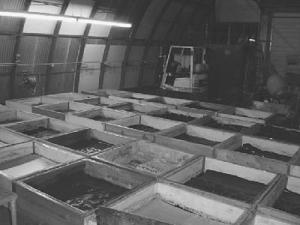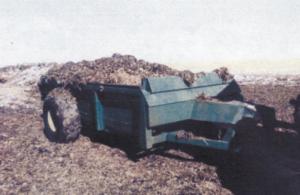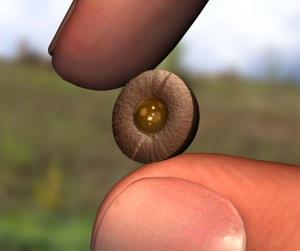Earthworm "Cocoons" Now In Production
We've been telling you for years about Bill Kreitzer's mission to boost earthworm populations by "planting" them right along with crops. Bill recently called to tell us that his "encapsulated earthworm cocoons" are now in production. In 2004, Kreitzer invented and patented VermiPodsÖ, (Encapsulated Earthworm CocoonsÖ). VermiPods are about the size of a soybean seed and contain from 1 to 10 worm eggs that can be planted right along with seed. The cocoon with eggs inside are ready to hatch and multiply when planted.
Kreitzer's research first appeared in FARM SHOW in 1990 (Vol. 14, No. 2). Since then he has developed another patented product called a VermiPodÖ, an Encapsulated Earthworm CocoonÖ created to serve as a natural means of soil enrichment. The cocoons are protected with a propriety coating technology that preserves the embryos 100%. This revolutionary, eco-friendly method for reintroducing earthworms back into the soil significantly reduces dependence on costly commercial fertilizers.
Kreitzer has achieved amazing results with his "Encapsulated Earthworm Cocoons." Worms in a 5-acre test plot on the Kreitzer farm have multiplied from 5000 to approximately a half a million worms/acre over the last 10 years. Soil that yielded 159 to 179 bu/acre corn now produces more than 200 bu/acre - with nitrogen applications applied only every other year when it is planted to corn and no phosphorus and potassium applications for the past 10 years; significantly reducing dependence on costly commercial fertilizers.
Kreitzer's company VermiPod, Inc. (VPI) raises breeder worms that lay cocoons at his production facility located on his farm south of Elliott, Ill. He likes to tell people that he is in the Earthworm Hatchery business: he collects the eggs of earthworms and encapsulates them.
The focus of Kreitzer's work is to make it easier for landowners to "plant worms". The easiest way is to mix VermiPods in with the seed at planting time. VermiPods can also be dropped into holes as soil samples are taken. Kreitzer recently patented another method using injection equipment, such as a liquid nitrogen applicator with tank. For example, to plant 1000 VermiPods/acre on 40 acres, 40,000 VermiPods would be put into a tank with 400 gallons of water and injected at 10 gallons/ acre.
"There is no minimum number of VermiPods to plant per acre," says Kreitzer. "However, the more you plant, the quicker the results will be. The key here is to get started so God's lowly earthworms can get to work." The use of anhydrous ammonia since WWII, along with pesticides and other modern day farming practices have depleted many soils of earthworms. Earthworms ingest organic material, aerate the soil and create burrows to improve water infiltration and reduce run-off. VPI's natural soil enrichment process is the most cost-effective and efficient method for replenishing micro-organisms and life-sustaining nutrients into the soil.
Kreitzer's VermiPods are available with five different worm species suited for different soil conditions and types. Depending on how many VermiPods are planted, it may take up to three years to realize any benefits from the worms multiplying in a field, Kreitzer says. The eventual goal is to get 500,000 to 1 million worms/acre, or somewhere between 12 to about 25/sq. ft.
After nearly 20 years of research and development, Kreitzer hasn't lost his enthusiasm or belief in the rejuvenating value of earthworms. He remembers the more than 300 FARM SHOW readers who contacted him after the original article. Many financially supported him. "If they donated money to the University of Illinois toward our research at that time, we want to send them some free VermiPods," he says.
For additional information about VermiPod Inc's Encapsulated Earthworm Cocoons (EEC's) or to learn about VermiPod Inc's additional product offering, visit the VermiPod Inc website at www.vermipod.com; or contact Bill as follows: Bill Kreitzer, VermiPod Inc., P.O. Box 1, 104 W. Market St., Elliott, Ill. 60933. Telephone: 217 .781. 4367. email: BillKreit

Click here to download page story appeared in.
Earthworm "Cocoons" Now In Production CROPS Miscellaneous 90-10-3 We've been telling you for years about Bill Kreitzer's mission to boost earthworm populations by "planting" them right along with crops. Bill recently called to tell us that his "encapsulated earthworm cocoons" are now in production. In 2004, Kreitzer invented and patented VermiPodsÖ, (Encapsulated Earthworm CocoonsÖ). VermiPods are about the size of a soybean seed and contain from 1 to 10 worm eggs that can be planted right along with seed. The cocoon with eggs inside are ready to hatch and multiply when planted.
Kreitzer's research first appeared in FARM SHOW in 1990 (Vol. 14, No. 2). Since then he has developed another patented product called a VermiPodÖ, an Encapsulated Earthworm CocoonÖ created to serve as a natural means of soil enrichment. The cocoons are protected with a propriety coating technology that preserves the embryos 100%. This revolutionary, eco-friendly method for reintroducing earthworms back into the soil significantly reduces dependence on costly commercial fertilizers.
Kreitzer has achieved amazing results with his "Encapsulated Earthworm Cocoons." Worms in a 5-acre test plot on the Kreitzer farm have multiplied from 5000 to approximately a half a million worms/acre over the last 10 years. Soil that yielded 159 to 179 bu/acre corn now produces more than 200 bu/acre - with nitrogen applications applied only every other year when it is planted to corn and no phosphorus and potassium applications for the past 10 years; significantly reducing dependence on costly commercial fertilizers.
Kreitzer's company VermiPod, Inc. (VPI) raises breeder worms that lay cocoons at his production facility located on his farm south of Elliott, Ill. He likes to tell people that he is in the Earthworm Hatchery business: he collects the eggs of earthworms and encapsulates them.
The focus of Kreitzer's work is to make it easier for landowners to "plant worms". The easiest way is to mix VermiPods in with the seed at planting time. VermiPods can also be dropped into holes as soil samples are taken. Kreitzer recently patented another method using injection equipment, such as a liquid nitrogen applicator with tank. For example, to plant 1000 VermiPods/acre on 40 acres, 40,000 VermiPods would be put into a tank with 400 gallons of water and injected at 10 gallons/ acre.
"There is no minimum number of VermiPods to plant per acre," says Kreitzer. "However, the more you plant, the quicker the results will be. The key here is to get started so God's lowly earthworms can get to work." The use of anhydrous ammonia since WWII, along with pesticides and other modern day farming practices have depleted many soils of earthworms. Earthworms ingest organic material, aerate the soil and create burrows to improve water infiltration and reduce run-off. VPI's natural soil enrichment process is the most cost-effective and efficient method for replenishing micro-organisms and life-sustaining nutrients into the soil.
Kreitzer's VermiPods are available with five different worm species suited for different soil conditions and types. Depending on how many VermiPods are planted, it may take up to three years to realize any benefits from the worms multiplying in a field, Kreitzer says. The eventual goal is to get 500,000 to 1 million worms/acre, or somewhere between 12 to about 25/sq. ft.
After nearly 20 years of research and development, Kreitzer hasn't lost his enthusiasm or belief in the rejuvenating value of earthworms. He remembers the more than 300 FARM SHOW readers who contacted him after the original article. Many financially supported him. "If they donated money to the University of Illinois toward our research at that time, we want to send them some free VermiPods," he says.
For additional information about VermiPod Inc's Encapsulated Earthworm Cocoons (EEC's) or to learn about VermiPod Inc's additional product offering, visit the VermiPod Inc website at www.vermipod.com; or contact Bill as follows: Bill Kreitzer, VermiPod Inc., P.O. Box 1, 104 W. Market St.
To read the rest of this story, download this issue below or click
here to register with your account number.








